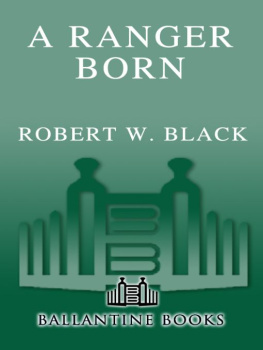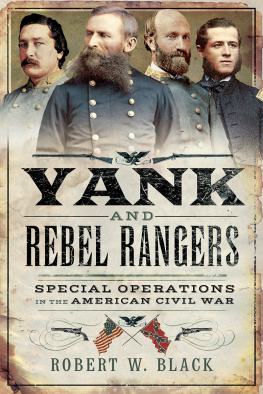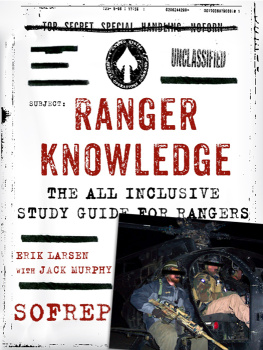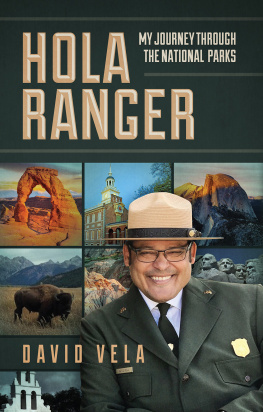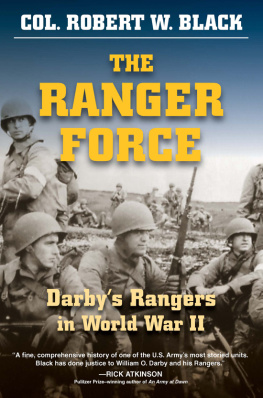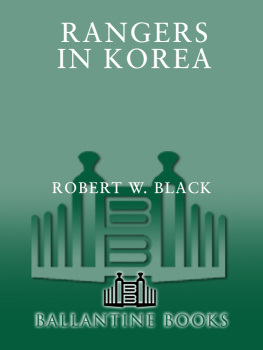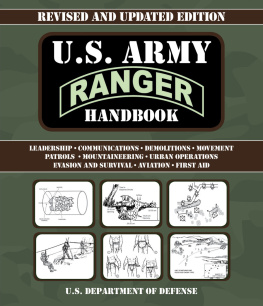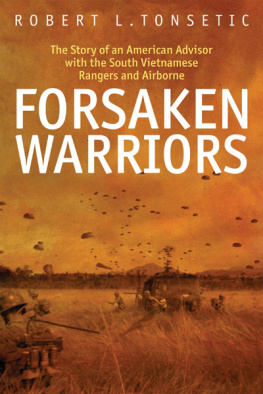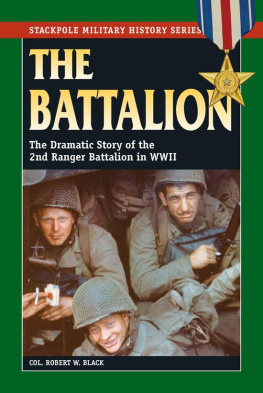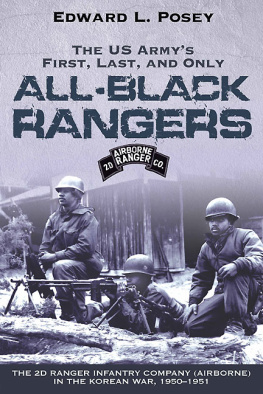Table of Contents
Patriotism was everywherethis was total commitment and effort. Factories were turning out war matriel. C. H. Masland was no longer making carpet but was now producing tents for the army and parachute backpack covers.... People were really angry. Young men were expected to be in uniform. Mom said that they were called slackers if they were not. My father said the stupidest thing the Japanese could have done was to attack Pearl Harbor. He said it united a disunited United States....
By Col. Robert W. Black
RANGERS IN KOREA
RANGERS IN WORLD WAR II
To my beloved daughter, April Black Croft.
So she knows.
Acknowledgments
To write a book is a considerable expenditure of time and effort. The author may believe in the work, but it takes the support of family and the editor to bring the effort to a successful conclusion. I am most fortunate to have a beloved friend, lover, wife, and proofreader, Carolyn Black, and my Ballantine editor, Chris Evans, who have both given their enthusiastic support. I also express my appreciation to my soldier friends who have served with me in Army khaki or green and talked of our experience in words that begin, Remember when...
Introduction
Once a Ranger, always a Ranger. I first heard those words more than a half century ago when I began the Ranger course of instruction at Fort Benning, Georgia. It takes considerable effort and will to achieve membership in this highly trained, all-volunteer military brotherhood. The reward is forever knowing that you were part of the best. The Ranger experience provides a lasting belief in self philosophy that is a shield against adversity.
To be a Ranger is to be unique. No military organization of the United States has the history of the American Ranger. We existed for over 165 years before the United States came into being. The Rangers fought six wars on American soil before the Declaration of Independence. In the Revolutionary War, Ranger units and Ranger leaders often made the difference between defeat and victory, submission and freedom. In the wars that followed, they continued to lead the way. The Rangers are a river of courage flowing through American history.
Ranging was a product of the American experience brought about by the vastness of our land and the method of war as practiced by the Native American. In the early 1600s when Capt. John Smith wrote the words I ranged that unknown country, war was the centerpiece of life for many Indian tribes. They were masters of small-unit tactics, the raid, and the ambush. It became evident that to survive in the new world, the early colonists required a new breed of fighting men, ranging outward in search of the enemy. The Ranger was born.
Throughout years of conflict in America and across the world, the volunteer spirit of the Ranger instilled in men the truth that It is all in the heart and the mind.... You can accomplish anything. That belief became the core of my being. It would not survive if it were arrogance. It is a willingness to meet the challenges of life and a determination to fight for what you know to be right no matter the odds or who the adversary might be.
Many men who have never heard the song of the bullet have written well-researched accounts of soldiers at war. I enjoy those, but reserve a special affection for the writings of those who have lived the experience. As one who loves history and despises the frequent revision of it, I have long enjoyed the firsthand accounts of the Rangers who went before me. From the 1600s onward, men who were American Rangers have left behind a record of the events that shaped their lives and the conduct of their wars. Rangers Benjamin Church, Robert Rogers, Noah Smithwick, Samuel Reid, Rip Ford, and James Altieri are among those who have told us of their lives as American Rangers. Some of them wrote of their misadventures as well as their adventuresI like that. It is enough of a challenge to be a Ranger without also being an angel.
A Ranger Born was written as an account of the events that had the most impact on my life. Growing up during the Great Depression and World War II had a profound impact on me. It was my privilege to fight two hot wars and one cold war for my country. It was my disappointment that the goal for the United States in both Korea and Vietnam became something other than victory. Victory is the only end that justifies the sacrifice of men at war.
If war had been the only challenge I faced, life would have been much simpler for me, but tragedy denied an ordered structure to my life and career. Grief tested every aspect of my being. It was in this challenge that I learned that the Ranger philosophy goes far beyond military usage. The words It is all in the heart and the mind.... You can accomplish anything are an azimuth to follow in life, and one that guided me safely through.
Ranger Robert Black
Prologue
It was a time of intensity, a grim night game where the stakes were life and death. We spent hours in patient movement under cover of a light wind and a thick cloak of darkness, first walking, holding on to the cartridge belt of the man to our front, and then crawling on our stomachs to quietly penetrate the Chinese positions. We were now beyond their forward line, but the Chinese had the numbers and employed a defense-in-depth. There would be another Chinese line of fortifications and another beyond that. In foxholes, bunkers, and trenches, men in quilted uniforms would be straining their senses searching the night against the possibility of our coming. A rifle stock knocking against a stone, a loose sleeve catching on a bush, or water sloshing in a half-filled canteen could betray our presence. I could not see the American to the front of me or the one to my rear, but they were there within reach of my hand or foot. We were tied together by training and tradition, bonded in a unique brotherhood of warriors.
The still of the night was broken by a sharp cry in an Oriental tongue. We froze in position. Overhead came the pop of a flare, then the hissing sound as it came to earth swaying beneath its parachute canopy. To retain night vision I closed one eye at the first sound of the flare. Turning my head in a barely perceptible motion, I saw the outline of a Chinese bunker to my right. Movement of a few yards would enable me to feel the edge of the opening and drop a fragmentation grenade into the firing slit. It was a temptation to be avoided. The flare burned out and the Chinese soldiers began talking in a conversational tone. We touched each other in signal and crawled silently onward. Ours was a mission of stealth, to penetrate enemy lines and lay mines along the trails used by his supply columns. The Chinese were veterans who would stay in Korea until they were dead or badly wounded, or until the war ended. They were skilled at the art of patrolling and made it a game of one-upmanship, frequently tailing American patrols and following them quietly through the night. When the American patrols returned on the same path, the Chinese would ambush and strike. That would not happen this night. Months of selectivity and arduous training had molded a band of American paratroopers who volunteered to seek and endure to an even higher level of combat skill. We had become the masters of night warfare. There was no one on our trail because we checked it. We were difficult to ambush, as our routes were carefully selected and our procedures practiced until they were routine. We always took a different route home. The Chinese were unaware of our presence that night. Soon, though, enemy soldiers who thought they were secure would die. Thats the calling card of the American Airborne Ranger.

